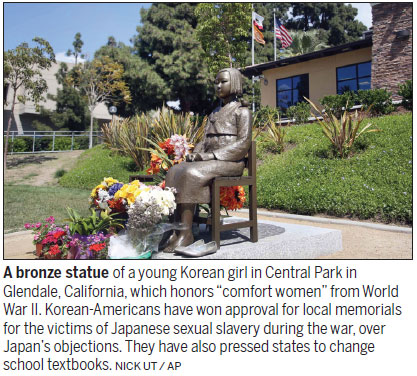Japan criticized over role in lawsuit about memorial
The Japanese government's recent involvement in a lawsuit demanding the removal of a "comfort women" memorial statue in Southern California is nothing but intimidation and an "intentional downplay of the historical facts", say statue's supporters.
The lawsuit was filed against the city of Glendale in 2014. The plaintiffs claimed the city unconstitutionally disrupted the US government's foreign policy and relationship with Japan.
The lawsuit was dismissed by a US District Court in 2015 and the Ninth Circuit Court of Appeals upheld the ruling in August 2016. A request for rehearing was denied by the appellate court in October.
In January, the case was brought to the US Supreme Court, and the Japanese government filed an amicus brief last week.
"It's absolutely ridiculous for Japan, a foreign government, to interfere with grass-roots activities in an American city," said Lillian Sing, co-chair of the Comfort Women Justice Coalition and a retired judge of San Francisco's Superior Court. "This lawsuit has lost at every level. We are confident it will lose again at this level."
She said the lawsuit was nothing but intimidation. "They try to have a chilling effect. We will not allow this to happen. This is a free country, and this is a country where people can speak the truth," she added.
The 1,100-pound bronze statue, depicting a girl in Korean garb sitting next to an empty chair, was erected in the city's Central Park in 2013.
Approved by the City Council and funded by Korean groups, the statue was dedicated to comfort women, a term the Japanese government used for its military's notorious sex slavery of an estimated 200,000 women before and during the World War II.
Japan said in the amicus brief that the statue concerns Japan's "national core interest" and disrupts "Japan's delicate relations with Korea".
The statue in Glendale represents hundreds of thousands of victims of Japan's 14 years of military sexual slavery from a dozen countries, not just Korea, said Phyllis Kim, executive director of Korean American Forum of California.
"Japan's claim that the 'Girl Statue' in Glendale represents the issue of 'comfort women' between Japan and the Republic of Korea is a gross mischaracterization and intentional downplay of the historical facts," she said.
The city also filed respondent's brief last week, calling for denial of the petition.
It said the Japanese government acknowledged its "involvement of the military authorities" in the crimes against the "comfort women", and apologized periodically. The US government has also recognized the crimes -House Resolution 121 - "urging the Japanese Government to accept historical responsibility for these crimes", says the respondent's brief.
The "problem" with Glendale is the city "adopted its own foreign policy which favors the view more favorable to Korea", said William Benjamin DeClercq, attorney of the petitioners.
"For example, Glendale did not remove its demand that Japan 'take historical responsibility' after the agreement of Dec 28, 2015," he said in an email to China Daily. "Japan honors that agreement but Glendale has ignored Japan's actions and the monument remains along with its permanent words that accuse Japan of wrongdoing on a basis that it strongly denies."
The agreement between Japan and South Korea was criticized for compromising the dignity of the victims for short-term gains.

























